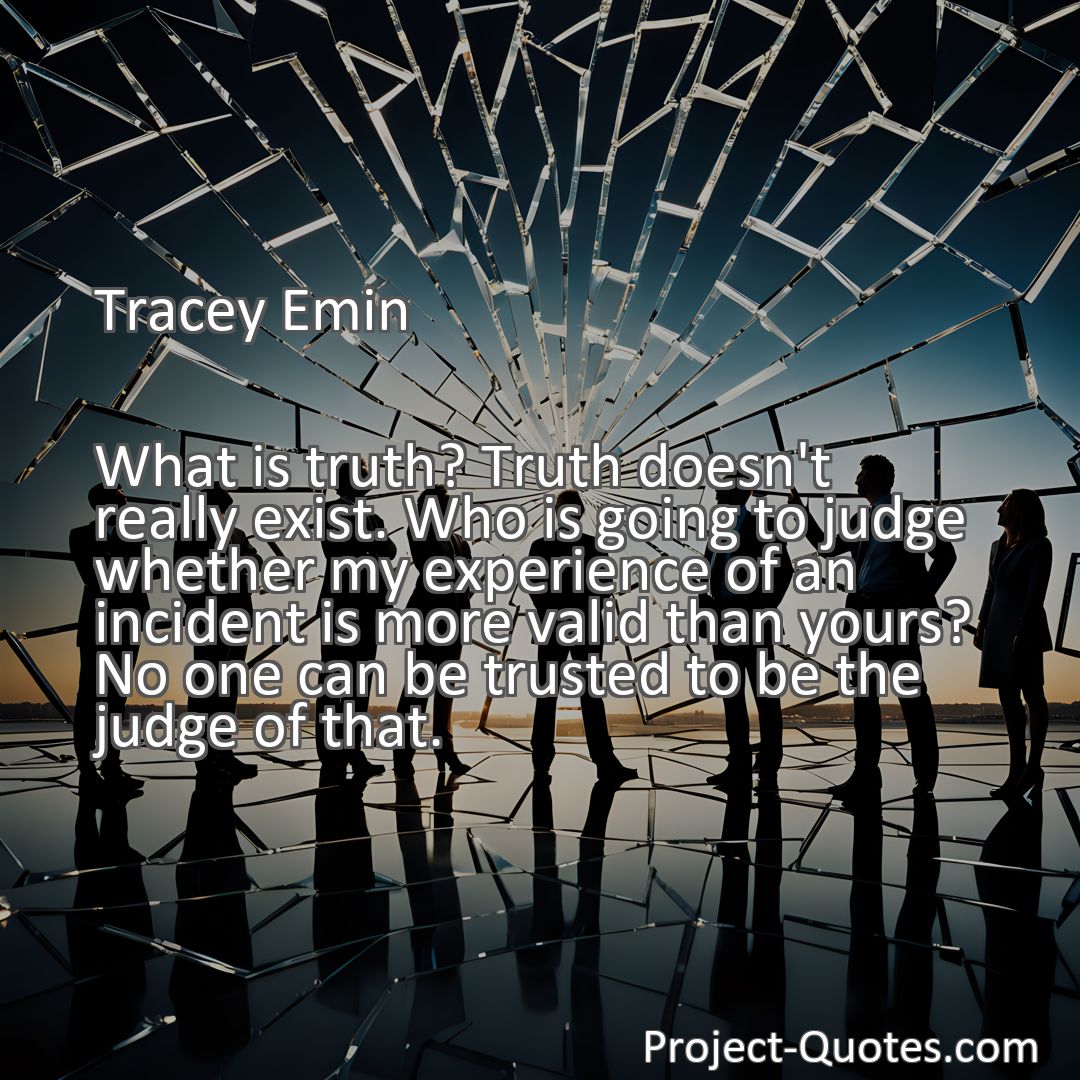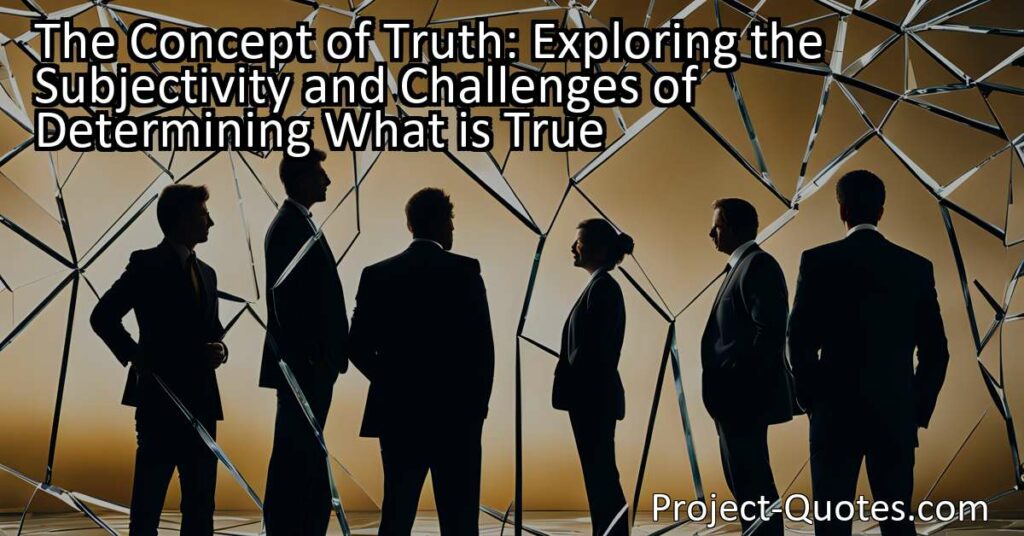What is truth? Truth doesn’t really exist. Who is going to judge whether my experience of an incident is more valid than yours? No one can be trusted to be the judge of that.
Tracey Emin
The concept of truth is explored in this engaging summary that delves into the subjectivity and challenges of determining what is true. The summary highlights the subjective nature of truth and how it can vary depending on experiences, beliefs, biases, and cultural background. It also discusses the difficulties in establishing a single judge of truth and the impact of societal power dynamics and misinformation. Ultimately, it emphasizes the importance of embracing diverse perspectives and critical thinking when evaluating information.
Table of Contents
- 1 What is truth? Truth doesn’t really exist. Who is going to judge whether my experience of an incident is more valid than yours? No one can be trusted to be the judge of that.
- 2 Tracey Emin
- 3 Meaning of Quote – What is truth? Truth doesn’t really exist. Who is going to judge whether my experience of an incident is more valid than yours? No one can be trusted to be the judge of that.
- 4 Freely Shareable Quote Image
- 5 Related
Meaning of Quote – What is truth? Truth doesn’t really exist. Who is going to judge whether my experience of an incident is more valid than yours? No one can be trusted to be the judge of that.
Have you ever wondered about the concept of truth? What does it really mean to say something is true? It’s a complex and fascinating question that has puzzled philosophers, scholars, and everyday individuals for centuries. In fact, some argue that truth doesn’t truly exist. Let’s explore this idea together and delve into the reasons why people question the existence of an absolute truth.
When we talk about truth, we often think of it as an objective and universal concept. It is something that can be measured, proven, and agreed upon by everyone. However, in reality, truth can be incredibly subjective. Each person’s perception and understanding of a situation can vary depending on their experiences, beliefs, biases, and cultural background. Therefore, who is to say that one person’s version of the truth is more valid than another’s?
Consider this scenario: two friends witness an accident. Despite being present at the same time and place, their accounts of what happened differ significantly. Friend A claims that the at-fault driver was speeding, while Friend B insists that the driver was obeying the speed limit. How do we determine whose account is more accurate? Who becomes the ultimate judge of the truth in this situation?
The answer is not clear-cut. No one can truly be trusted to be the sole judge of what is true or false. Even our own memories and perceptions can be deceptive at times. It is well known that eyewitness testimonies can be unreliable, as our brains often fill in gaps with imagined details or misinterpret what we see. This is why courts often rely on corroborating evidence and multiple testimonies to build a more comprehensive understanding of what really happened.
Furthermore, our individual experiences shape our understanding of truth. Imagine two people who witness a beautiful sunset. One of them is an artist, appreciating the colors, textures, and overall aesthetic. The other is a scientist, fascinated by the atmospheric conditions, light refraction, and precise positioning of celestial bodies. Are their experiences any less valid because they focus on different aspects of the sunset? Of course not. Each person’s truth is shaped by their unique perspectives and interests.
The subjectivity of truth becomes even more apparent when we consider cultural differences. What may be considered an absolute truth in one society may be completely disregarded or even condemned in another. One such example is the perception of time. In Western cultures, punctuality is highly valued, and being late is often seen as disrespectful. However, in some other cultures, being fashionably late is the norm and even expected. Who is to say which perspective is the “correct” one?
Moreover, truth can be influenced by societal power dynamics. Throughout history, those in power have often been the ones to shape and control what is considered true. They decide what information is presented to the public, control educational curricula, and mold public opinion. These power dynamics can further blur the line between truth and manipulation.
In the age of social media and the constant bombardment of information, determining what is true becomes even more challenging. Fake news and misinformation spread like wildfire, making it difficult to separate fact from fiction. With millions of sources of information available at our fingertips, it is crucial to critically analyze and cross-reference multiple sources to arrive at a more accurate understanding of the truth.
So, does truth really exist? The answer may not be a simple yes or no. Rather, it is a complex web of individual perspectives, societal norms, and cultural biases. Engaging in open dialogue and embracing diverse perspectives can help us to explore different truths and broaden our understanding of the world.
However, this does not mean that truth is entirely relative and that anything goes. There are certain fundamental truths that serve as the foundation of our understanding. For example, the laws of physics and mathematics are based on fundamental principles that have been tested, observed, and proven time and time again. These truths provide a common ground and enable us to build upon our scientific knowledge.
In conclusion, the existence of truth is a matter of perspective, influenced by individual experiences, societal norms, and cultural differences. While absolute and objective truth may be elusive, it is important to strive for accuracy and critical thinking when evaluating information. By acknowledging our own biases and embracing multiple perspectives, we can navigate the complex landscape of truth and foster a more informed and understanding society.
I hope this quote inspired image brings you hope and peace. Share it with someone who needs it today!


